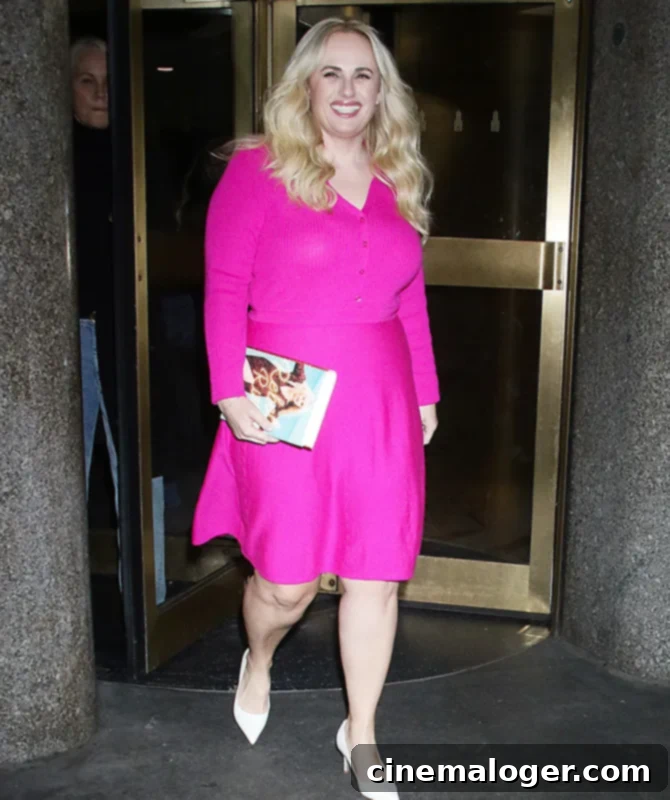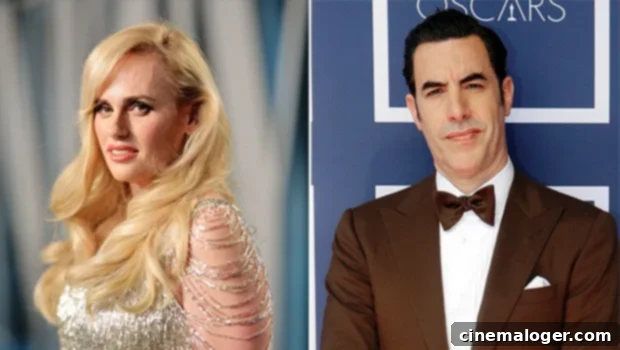Rebel Wilson’s ‘Rebel Rising’: UK Edition Faces Redactions Amid Sacha Baron Cohen Controversy
The highly anticipated memoir, Rebel Rising, by beloved actress Rebel Wilson, has captivated readers since its initial release in the U.S. earlier this month. However, its arrival in the United Kingdom on Thursday, April 25, has been met with significant attention, not for its revelations, but for its notable omissions. Readers in the U.K. will find that several key passages concerning Sacha Baron Cohen, with whom Wilson collaborated on the film Grimsby, have been entirely redacted from their edition. This development has ignited a spirited debate surrounding freedom of speech, libel laws, and the intricate world of celebrity publishing.
The original U.S. publication of Rebel Rising featured multiple “bombshell claims” from the 44-year-old Pitch Perfect star directed at the 52-year-old comedian. These allegations, which quickly became a major talking point in entertainment news, detailed experiences Wilson purportedly had while working alongside Baron Cohen. The decision to remove these statements for the U.K. market underscores the stark differences in defamation laws between the two nations, prompting both legal and ethical discussions within the publishing industry and among the public.
The Publisher’s Perspective: Navigating Legal Complexities
HarperCollins, the publisher behind Rebel Rising, confirmed the redactions in a statement obtained by PEOPLE. A spokesperson clarified, “We are publishing every page, but for legal reasons, in the U.K. edition, we are redacting most of one page with some other small redactions and an explanatory note.” This move highlights the delicate balance publishers must maintain between an author’s right to tell their story and the stringent legal frameworks, particularly those governing libel and defamation. The spokesperson further added, “Those sections are a very small part of a much bigger story, and we’re excited for readers to know Rebel’s story when the book is released.” This suggests an attempt to downplay the significance of the excised content, emphasizing the broader narrative of Wilson’s life as presented in the memoir.
The necessity for such redactions is a direct consequence of the United Kingdom’s robust defamation laws, which are considerably stricter than those in the United States. In the U.K., the burden of proof often falls on the defendant (the publisher and author) to demonstrate the truth of a published statement, rather than on the claimant (the person alleging defamation) to prove its falsity. This legal landscape creates a high-stakes environment for publishers, often leading to pre-emptive removals of potentially litigious content to avoid costly and protracted legal battles. HarperCollins’ decision, therefore, reflects a pragmatic approach to ensure the memoir could be published in the U.K. market without incurring legal risks.
Sacha Baron Cohen’s Vehement Denial and Legal Stance
In response to the controversy and Wilson’s initial claims, a representative for Sacha Baron Cohen issued a strong statement, alleging significant lapses in the publication process. The rep asserted that HarperCollins “did not fact check this chapter in the book prior to publication” and claimed that the publisher “took the sensible but terribly belated step of deleting Rebel Wilson’s defamatory claims once presented with evidence that they were false.” This statement positions Baron Cohen as a victim of unsubstantiated accusations and portrays the redactions as a vindication of his position, suggesting that legal pressure compelled the publisher to correct factual inaccuracies.

The representative further emphasized the gravity of defamation laws, stating, “Printing falsehoods is against the law in the U.K. and Australia; this is not a ‘peculiarity’ as Ms. Wilson said but a legal principle that has existed for many hundreds of years.” This highlights the fundamental difference in legal cultures and pushes back against any perception that these laws are an arbitrary hindrance. Baron Cohen’s team declared this outcome a “clear victory for Sacha Baron Cohen and confirms what we said from the beginning — that this is demonstrably false, in a shameful and failed effort to sell books.” This assertive stance not only denies the allegations but also frames the entire episode as a calculated attempt by Wilson to leverage sensational claims for commercial gain, a serious accusation within the literary and entertainment spheres.
The Heart of the Allegations: Rebel Wilson’s Account from ‘Grimsby’ Set
In the uncensored U.S. version of her memoir, Rebel Wilson leveled accusations of sexual harassment against Sacha Baron Cohen, recounting incidents that allegedly occurred during the production of their 2016 spy comedy, Grimsby (also known as The Brothers Grimsby). Wilson, known for her comedic prowess and vibrant personality, detailed unsettling encounters that left her feeling uncomfortable and objectified on set. Her account offers a stark contrast to the lighthearted nature of the film, shedding light on the darker aspects of her professional experiences.
One primary allegation concerned Baron Cohen’s repeated suggestions for her to appear nude. “It felt like every time I’d speak to SBC, he’d mention that he wanted me to go naked in a future scene,” Wilson claimed in an excerpt from the original memoir. Her consistent refusal—”I was like, ‘Ha, I don’t do nudity, Sacha'”—reportedly did little to deter his persistence, creating an environment she perceived as coercive. This alleged pattern of behavior raises important questions about power dynamics in Hollywood and the pressures actors, particularly women, can face regarding their bodies and boundaries.
The most shocking of Wilson’s claims detailed an alleged incident where Baron Cohen, through a production assistant, requested her presence for an “additional scene.” Wilson recounted the moment: “‘OK, well, we’re gonna film this extra scene,’ SBC says.” What followed, according to Wilson, was a highly inappropriate and unexpected request. “Then he pulls his pants down. SBC says very matter-of-factly: ‘OK, now I want you to stick your finger up my ass.’ And I’m like, ‘What?? … No!!'” This graphic and disturbing account, if true, depicts a clear breach of professional conduct and personal boundaries, sparking outrage among Wilson’s supporters and prompting intense scrutiny of Baron Cohen’s behavior on set.
A Counter-Narrative: The Producer’s Defense and Script Context
In the wake of Wilson’s allegations, an anonymous producer associated with the film came forward to defend Sacha Baron Cohen and the production team. In a statement obtained by PEOPLE, the producer offered an alternative interpretation of the controversial scene, suggesting a misunderstanding or misrepresentation of the scripted content. “As per the script, which Rebel had read and approved in advance, her character was attempting to put a finger in Sacha’s character’s butt,” the producer claimed. This defense hinges on the critical distinction between an actor’s character performing an action within the narrative and a direct, unsolicited personal request from one actor to another.
The producer further emphasized that “At no point did Sacha actually ask her to put a finger in his butt.” This clarification seeks to separate the fictional demands of the script from any alleged real-world harassment, framing the incident as a creative misunderstanding rather than an act of misconduct. The statement concluded by asserting that throughout the entire period of production, Wilson “was treated with the utmost respect and empowerment and was welcomed as a collaborator in all creative areas.” This counter-narrative aims to portray a professional and respectful working environment, directly contradicting Wilson’s claims of harassment and establishing a stark contrast in recollections of the same events.
Understanding UK Libel Laws: A Global Perspective on Publishing
The fundamental reason for the redactions in Rebel Rising‘s U.K. edition lies in the country’s notoriously strict libel laws, which have historically presented significant challenges for authors and publishers. Unlike the United States, where the First Amendment broadly protects freedom of speech and places a high burden of proof on public figures to demonstrate “actual malice” in defamation cases, U.K. law operates differently. In the U.K., the burden often shifts to the defendant (the author and publisher) to prove the truth of their statements, and even unintentional inaccuracies can lead to costly lawsuits and significant damages.
This legal framework means that allegations, even if believed by the author to be true, must be backed by irrefutable evidence that can withstand rigorous scrutiny in a U.K. court. Publishers like HarperCollins, therefore, must make strategic decisions to protect themselves from potential legal action. The risk of being sued for defamation in the U.K. is so substantial that many authors and journalists refer to London as the “libel capital of the world.” The threat of injunctions, extensive legal fees, and substantial payouts often compels publishers to redact or alter content that might be permissible in other jurisdictions. This incident with Rebel Rising serves as a potent reminder of how national legal systems directly impact the global dissemination of information and creative works.
The Broader Impact: Celebrity Memoirs and the Quest for Truth
The controversy surrounding Rebel Rising extends beyond the immediate parties, sparking wider discussions about the nature of celebrity memoirs and their role in revealing personal truths. Memoirs are inherently subjective, offering an author’s personal recollections and interpretations of events. However, when these accounts include serious allegations against other public figures, the line between personal narrative and potentially defamatory statement becomes blurred. This case highlights the intricate ethical and legal tightrope that authors and publishers must walk, especially in an era where the “Me Too” movement has emboldened individuals to share their experiences of harassment and abuse.
The public’s appetite for celebrity revelations is immense, but so too is the responsibility to ensure accuracy and fairness, particularly when reputations are at stake. This incident underscores the challenges of fact-checking deeply personal narratives, where corroborating evidence may be scarce or disputed. It also raises questions about how the entertainment industry handles such allegations, both legally and culturally. The contrasting versions of Wilson’s memoir across different territories force readers to confront the complexities of truth, memory, and legal constraints, leaving them to ponder which narrative, if any, fully encapsulates the reality of the situation. The ongoing debate surrounding Rebel Rising serves as a significant case study in the evolving landscape of celebrity memoirs, free speech, and the enduring power of legal systems to shape what stories can, and cannot, be told.
